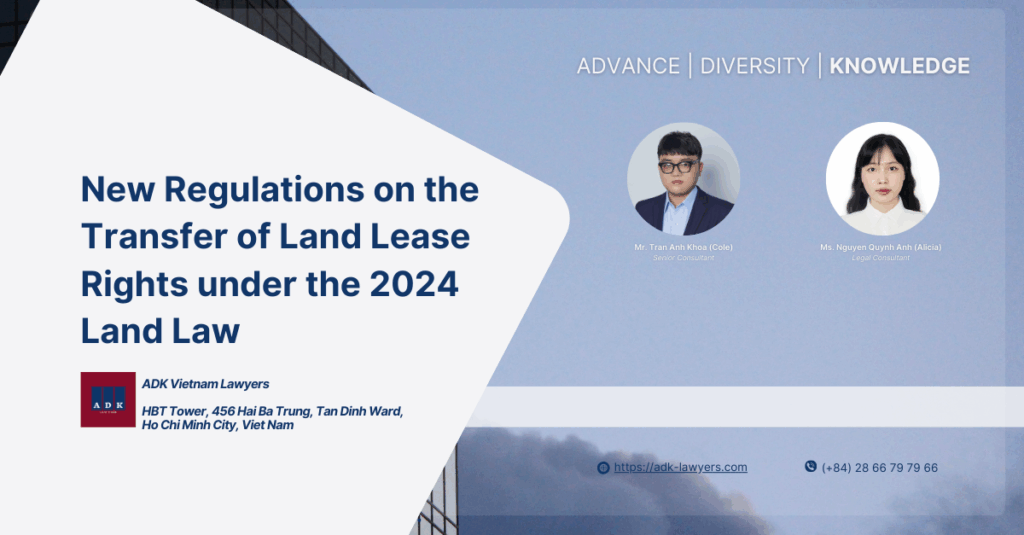Update: 24.11.2025

In the context of the rapid development of the market economy and the increasingly diverse and flexible land exploitation and use needs, the recognition and legal regulation of rights arising from land lease relations with the State have become a pressing requirement. One of the standout features of the Land Law 2024 is the first-time recognition of the “land lease rights in land lease contracts” as an independent property right that can be transferred. This provision creates a legal framework that allows land users to optimize investment and land use efficiency. The transfer of land lease rights not only expands access to land for both domestic and foreign organizations and individuals but also contributes to the establishment of a transparent, dynamic, and modern land market. However, alongside these great opportunities, this new regulation also presents several challenges regarding legislative techniques, implementation mechanisms, and the ability to control legal risks in practical applications. This article will comprehensively analyze the new provisions related to the transfer of land lease rights under the Land Law 2024, clarifying the conditions, stakeholders, legal characteristics, as well as the issues arising in the implementation process.
I. Overview of the transfer of land lease rights under land lease contracts
1.1 Land lease rights in land lease contracts
The concept of land lease rights in land lease contracts is a completely new legal concept for land users, first recognized in the Land Law 2024. Article 3.37 of the Land Law 2024 states: “Land lease rights in land lease contracts are the rights of land users formed when the State leases land for annual rental payments. Land users are entitled to transfer their land lease rights under the lease contract; the transferee of the land lease rights inherits the rights and obligations of the land user as stipulated in this Law and other relevant legal provisions.”
From this regulation, it can be seen that the Land Law 2024 does not yet fully define the substance of the land lease rights in the contract. It only recognizes that this is a right of the land user, formed when the State leases land with annual rental payments, and stipulates that the legal consequence of transferring the lease rights is that the transferee inherits all the rights and obligations of the original land user under the lease contract with the State.
1.2 Transfer of land use rights in land lease contracts
The transfer of land lease rights in a land lease contract is understood as a legal action carried out by the lessee to transfer all the rights and obligations arising from the signed land lease contract with the State to another party through an agreement. This is a form of transfer that involves a comprehensive inheritance, whereby the transferee becomes the new party in the legal relationship with the State, continuing to fulfill the rights and obligations under the existing lease contract without the need to establish a new lease agreement.
In essence, this transaction does not alter the content of the land lease contract between the State and the land user; it only changes the party executing the contract. In other words, the land lease rights in the contract represent the right to request the State, as the lessor, to continue the lease agreement with the transferee. At the same time, the transferee is entitled to continue exploiting and utilizing the land according to the intended use, duration, area, and other conditions approved by the State and reflected in the original lease agreement.
Moreover, according to the current provisions of the Land Law, it can be asserted that land lease rights in the contract cannot be the subject of an independent transaction, separate from the land-related assets. In other words, the land user is not allowed to transfer the land lease rights in the contract independently without simultaneously transferring the legal ownership of the assets attached to the land.
II. Legal provisions on the transfer of land lease rights under land lease contracts
2.1 Entities allowed to conduct the transfer of land lease rights under land lease contracts
According to Article 3.37 of the Land Law 2024, the transfer of land lease rights under land lease contracts only applies in cases where the State leases land with annual rental payments. Therefore, apart from special cases for public non-business units as per Article 34.2 of this Law, the entities allowed to perform the transfer of land lease rights under land lease contracts include::
(i) Economic organizations that are leased land by the State for annual rental payments; economic organizations that receive land use rights transfers for agricultural land and change the land’s intended use, in cases where the State leases land for annual rental payments; economic organizations that use land permitted by competent authorities to change the use of land from land not paying for land use rights to land leased by the State for annual rental payments.
(Article 34.1.c, Article 35.3.c, Article 35.4.b of the Land Law 2024)
(ii) Individuals leased land by the State for annual rental payments; individuals leasing land in industrial zones, industrial clusters, or high-tech parks with annual rental payments; individuals who use land that is allowed by competent authorities to change the land’s intended use from land that is exempt from land use fees to land leased by the State for annual rental payments.
(Article 37.2.b, Article 37.3.b, Article 38.2.b of the Land Law 2024)
(iii) Overseas Vietnamese, foreign-invested economic organizations to which the State leases land with annual land rental payments; foreign-invested economic organizations that use land formed by foreign investors purchasing shares or contributing capital corresponding to the form of annual land rental payments; foreign-invested economic organizations that are converted from joint ventures where the Vietnamese party contributes land use rights, in cases where the land use rights received from such contributions are not to be used for implementing housing investment projects for sale, and foreign-invested economic organizations to which the State leases land with annual land rental payments; overseas Vietnamese, foreign-invested economic organizations leasing land or subleasing land in industrial zones, industrial complexes, and high-tech parks with annual rental payments or subleasing land on an annual basis.
(Article 41.2.d, Article 41.4 of the Land Law 2024)
2.2 Conditions for the transfer of land lease rights under land lease contracts
2.2.1 Conditions for the Transferor
To prevent speculation, profiteering, or disguised transfer activities through land lease rights, Article 46 of the Land Law 2024 sets clear conditions for the transferor to be eligible for transferring land lease rights under land lease contracts. Accordingly, economic organizations, individuals, overseas Vietnamese, and foreign-invested organizations that are leased land by the State have the right to transfer the attached land assets together with the lease rights, provided that they meet the following conditions:
(i) The assets attached to the leased land must be legally established and registered in accordance with the law;
(ii) Construction must be completed according to the detailed construction planning and the investment project approved by competent authorities (if any), except for cases involving court judgments, enforcement decisions, or conclusions from competent authorities on inspection, audit, or enforcement; and
(iii) The transferor must have paid the compensation, support, and resettlement costs in advance, and the remaining balance should not have been deducted from the land rental obligations payable to the State.
These conditions indicate that, unlike the case where the land user is only allowed to transfer the land-attached assets, the pre-condition for transferring the land lease rights under the contract is that the transferor must have paid compensation, support, and resettlement costs, with the amount not yet deducted from the land rental obligations payable to the State.
This reveals that the essence of transferring land lease rights in the contract is transferring the value of compensation, support, and resettlement costs that the transferor has paid to the displaced land users on behalf of the State but has not yet been deducted from the land rental obligations.
2.2.2 Conditions for the Transferee
+ Financial capacity to execute the investment project: According to Article 9.2.c of the 2023 Real Estate Business Law, the transferee must have capital no less than 20% of the total investment for projects with land use of less than 20 hectares, or no less than 15% for projects with land use of 20 hectares or more, and must demonstrate the ability to mobilize capital to execute the investment project.
However, it should be noted that the financial capacity condition only applies when the leased land is granted by the State to the transferor for investment projects. If the leased land is for simple production and business purposes, not associated with a specific investment project, this requirement does not apply.
+ Suitable business lines: The transferee must have business lines related to the land-attached assets. For example, if the project is a hotel, the transferee must be authorized to engage in the accommodation services business in accordance with the law.
+ Compliance with land law: The transferee must comply with land law regulations for cases where the State has granted or leased the land for a project.
- Conclusion
The new provisions in the Land Law 2024 regarding the transfer of land lease rights represent an important step forward in improving the legal framework on land, creating favorable conditions for investment, business activities, and the effective use of land. The recognition of the transfer of land lease rights in specific cases has expanded access to land for individuals and organizations both domestically and internationally, while also establishing a flexible legal mechanism for restructuring land use in line with socio-economic development needs.
However, alongside these positive aspects, some “legal gaps” still exist, which may affect the transparency and effectiveness of implementation. Specifically, the Land Law 2024 does not clarify the mandatory legal form of the land lease rights transfer contract, leading to inconsistency in practice and potential legal disputes between the parties. Moreover, the absence of regulations on the effective date of the transfer transaction may result in difficulties in defining ownership rights, financial obligations, and resolving disputes.
To address these shortcomings, it is necessary to issue a decree providing detailed guidance on the implementation of the Land Law 2024, which should clarify: (i) whether the transfer contract needs to be notarized or authenticated; (ii) the effective date of the transfer transaction; (iii) the registration process for the transferee’s lease rights. These specific guidelines will help ensure uniform application of the law and minimize legal risks for the parties involved.
In conclusion, the new regulations on the transfer of land lease rights have opened up significant opportunities for the development of a transparent, stable, and more efficient land market. However, to realize these opportunities, it is essential to improve the system of guiding documents and ensure effective coordination between government agencies and economic stakeholders to achieve the best implementation of the law.
ADK Vietnam Lawyers



